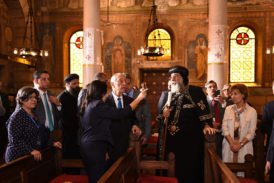By Shady Negm, Special to The Tablet
CAIRO – It has been seven years since the Egyptian military brutally murdered 26 Coptic Christians who were peacefully protesting against sectarian attacks on their churches. Not only has justice not been served, but the hardliners’ attacks also have continued.

Last week, the Coptic Church commemorated the anniversary of the massacre. As happens each year, a wave of social media posts and comments express anger and frustration at what happened and call for the opening of a new investigation.
In the chaos that followed the fall of Hosni Mubarak’s regime in January 2011, the Coptic community in Egypt was the most vulnerable; Christians suffered more than 11 sectarian attacks that year.
On Sept. 30, 2011, following an attempt to renovate a church, Islamists led a sectarian attack on Al-Marynab village in the governorate of Aswan. In response, Coptic movements launched multiple demonstrations, demanding that military authorities protect their churches and bring the perpetrators to justice.
The Supreme Council of Armed Forces, which was in power at the time, did nothing to stop the Islamists so the Copts declared a sit-in at the Maspero area in front of the state television building.
On Oct. 9, military police assaulted the protesters with soldiers deliberately driving military vehicles at high speeds toward the crowd of protesters, running over a number of them in a horrible scene. Survivors told the local media that bullets were flying everywhere and people were dying under the wheels of military vehicles.
Attacks Continue
Seven years later, only three soldiers were convicted of involuntary manslaughter and sentenced to three years in prison, while the attacks on churches continue.
Since the beginning of 2018, Muslim hardliners have attacked Coptic churches. The latest was last August in the village of Dimshau Hashim, 155 miles south of Cairo, when hundreds of Muslim mobs ransacked, looted and set fire to Copts homes in protest of using a home as a church.
The prosecution released all defendants involved in the attacks, not only in Dimshau Hashim, but also in another attack last December on a church in Ettfeh, located in the Giza governorate. The court acquitted all 19 defendants and the Christian homeowner, who was accused of opening a church in his home without a permit.
The common pattern in the attacks is the state’s failure to provide protection for Copts and moreover, depending on the resolution, creating situations of impunity for the perpetrators of violence.
Churches in Egypt face a dilemma over licensing, despite a 2016 law to regulate the construction of churches, and Muslim hardliners continue to attack churches on the grounds that there are no licenses yet.
In recent weeks, Egypt’s Cabinet approved the licensing of 120 churches and affiliated buildings to be used as Christian community centers.
In a year’s time, the Cabinet committee issued approvals to legalize only 340 of the 3,730 churches and service buildings that need licenses.
